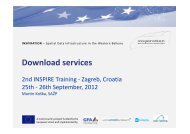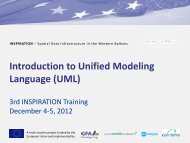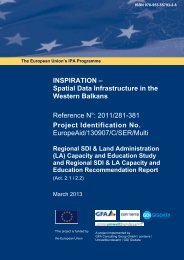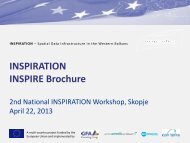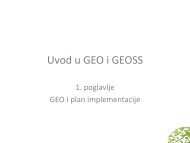MOVE - Moderation and Visualization for Group ... - INSPIRATION
MOVE - Moderation and Visualization for Group ... - INSPIRATION
MOVE - Moderation and Visualization for Group ... - INSPIRATION
Create successful ePaper yourself
Turn your PDF publications into a flip-book with our unique Google optimized e-Paper software.
create a favorable atmosphere <strong>for</strong> learning <strong>and</strong><br />
dialogue <strong>and</strong> to sensitize <strong>and</strong> motivate the group.<br />
Also, the participants should experience the<br />
<strong>MOVE</strong> working principles through a process of<br />
learning by doing.<br />
Questions Questions are are keys keys to to to unlocking unlocking unlocking new new doors<br />
doors<br />
One of the indispensable elements of effective<br />
communication <strong>and</strong> interaction among people<br />
participating in an event is an equal opportunity<br />
to contribute to the dialogue. This opportunity<br />
does not exist if the moderator or the resource<br />
persons hold monologue lectures. In order to<br />
avoid this domination, the moderator should<br />
encourage communication between the participants<br />
<strong>and</strong> the resource persons or among the<br />
participants themselves by asking questions.<br />
Through these questions, experience <strong>and</strong> basic<br />
knowledge are mobilized. The team will be able<br />
to identify in<strong>for</strong>mation needs on the one h<strong>and</strong>,<br />
<strong>and</strong> promote the exchange of experience among<br />
the participants on the other. Each new step in<br />
the group learning process should be opened by<br />
the moderator asking a carefully <strong>for</strong>mulated <strong>and</strong><br />
visualized question.<br />
42<br />
Good Questions<br />
● induce curiosity by posing open questions<br />
● stimulate further dialogue<br />
● create group underst<strong>and</strong>ing instead of<br />
isolating individuals<br />
● touch common interests<br />
● strategically advance the group process<br />
through personal involvement<br />
● reveal aims, signify aspirations, or include<br />
an explanation of intentions <strong>and</strong> actions<br />
● bring out the positive qualities of a group<br />
<strong>and</strong> its achievements<br />
● may be provocative or challenging, if<br />
necessary or useful<br />
Bad Questions<br />
● are closed, leading or rhetorical, i.e.,<br />
dem<strong>and</strong>ing „yes/no“ or obvious answers<br />
● are vague, general statements<br />
● can only be answered by an absent expert<br />
● require evidence that is unavailable<br />
● threaten to invade an individual’s<br />
privacy or culture<br />
● are paternalistic or suggestive<br />
● demonstrate someone’s incompetence<br />
● do not focus on the problem under<br />
investigation








